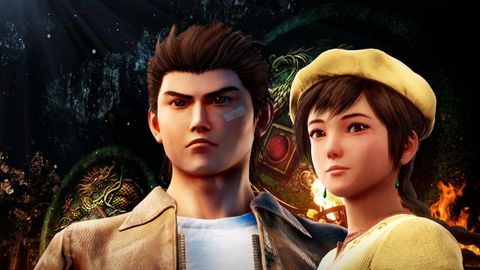Our Verdict
A seamless continuation of the series that makes up for its limitations with pure heart. It's like Ryo never left us.
PC Gamer's got your back
What is it? A martial arts adventure set in 1980s China.
Expect to pay £45/$50
Developer Ys Net
Publisher Deep Silver
Reviewed on GTX 1080, Intel i7-9700K, 16GB RAM
Multiplayer None
Nestled in the mist-shrouded mountains of rural China, Bailu Village is a settlement frozen in time. People live slow lives here among rice paddies, ornate Buddhist temples, quaint cottages, and fields of colourful wildflowers. There are some clues that Shenmue 3 is set in the 1980s—a woman's oversized glasses, a bleepy arcade cabinet—but otherwise life here seems to have changed very little in the past hundred or so years.
It's an ideal setting for a Shenmue game, a series famous for its languid, aggressively deliberate pacing. This is a game as slow and meandering as the old man strolling through Bailu's marketplace deciding which kind of steamed bun to have for lunch. And the village's steadfast resistance to a changing world, to the creep of modernisation, neatly reflects Shenmue 3 itself.
This unlikely sequel sticks so closely to the formula of the first two games that it's almost as if the last 18 years of game design never happened. And honestly, as a fan, I couldn't be happier. From its earliest days the Shenmue series has been divisive, with opinion rarely falling in the middle. You either think it's an emotional, groundbreaking masterpiece or an indulgent, clunky mess.
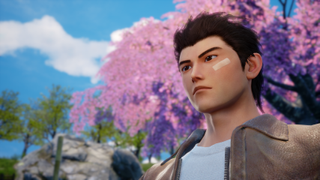
If you belong to the latter camp, I'll come right out and say it: Shenmue 3 won't change your mind. At all. The passage of time has only heightened the things that people crticise it for. The cumbersome controls, the abundance of cutscenes, the QTEs, the aching slowness of everything. But if you love these games for their idiosyncrasies, indefinable charm, sense of place, and warmth, this is really as perfect a continuation of the series as you could hope for—with a few caveats. The important thing is that it is, in every way, a true Shenmue game: a sentiment you'll find either deeply off-putting or massively exciting.
It's been 18 years since Shenmue 2 was released, but the third game picks up immediately where it left off. Japanese teenager Ryo Hazuki is desperately searching for the man who killed his father, a journey that has taken him from his hometown of Yokosuka to this remote mountain village. Central to Shenmue's plot are a pair of ancient artifacts, the Phoenix Mirror and the Dragon Mirror, which are deeply connected, somehow, to both the history of Bailu Village and the brutal murder of Ryo's father.
Shenmue is, essentially, a detective game. You spend the majority of your time talking to people, asking questions, finding clues, and pulling on threads until the next piece of the puzzle reveals itself. Occasionally things turn violent and Ryo is forced to fight, either through QTEs or enjoyable combo-based martial arts combat. But mostly it's just walking and talking, with some life simulation thrown in for good measure. You can chop wood or drive forklifts to earn money, eat food to restore stamina, or train at the dojo to level up your kung-fu.
It's not all work and self improvement. You can gamble, betting on racing turtles and, yes, Lucky Hit. Or you can visit the arcade and play some games, which are fun but not a patch on the arcades from the Sega-published entries in the series. There's no Hang On or Space Harrier here, sadly. There are herbs to pick and sell, capsule toys to collect, and fish to catch. In a game where events don't trigger till certain times of day, these are a useful distraction. But they're equally handy if you just want to take a break and enjoy yourself.
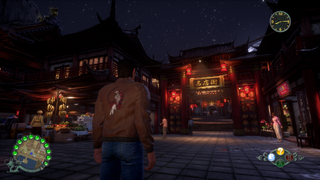
When you first arrive in Bailu people are cold and wary, refusing to answer your questions in some cases. There's a real feeling of being an outsider, which makes sense in an isolated place like this. But over time, as you get to know the villagers, they get to know you as well. You can sense them warming to you, opening up. Eventually Ryo will address people by name when you start a conversation and they'll comment on things you've done around the village.
There's a genuine sense of community in Shenmue 3 and the more I played it, the more Bailu started to feel like home. Similar to Yokosuka in the first game, there's something magical about getting to know a place, its people, and its routines. At night you'll see Wang and Liu, the village watchmen, retreat to the Drunken Panda pub for a well-earned beer. In the afternoons you'll find Lei, a young trainee martial artist, practicing his form in the local temple.
Under the stars
Bailu feels like a place, not just a static movie set, and when it was time to move on in the story I was genuinely sad to leave it behind. It's clear Shenmue 3 is a relatively low budget game, with visuals that feel slightly sterile at times. Even so, Bailu is gorgeous to look at, its evocative art design triumphing over its technical limitations. At night the sky floods with stars and moonlight falls over the cottages, smoke billowing from their chimneys, lights glowing warmly inside. By day it's all butterflies, blooming flowers, and bright blue skies. It's just a really cosy game, a tradition I'm glad to see the third game continue.
Turns out Ryo is pretty deep when you get past that stoic facade
Joining you this time is Shenhua Ling, a kind-hearted local girl whose father has gone missing and whose fate seems somehow entwined with Ryo's. We've always had likeable allies in this series, whether it's Guizhang in the original or Ren in the sequel, but they usually take a back seat, conveniently appearing when you're in trouble. But in this game Shenhua is much more of a companion, frequently accompanying Ryo into the village as he pursues his next line of inquiry. People in town will even be more cooperative with Shenhua in tow. And because Ryo is staying at her house you can speak to her every night before bed, catching up on the day's events and planning your next move together.
It's wonderful watching their relationship blossom. Over the hearth they'll ask each other questions about their lives, hopes, and regrets, and in these moments we see a new side to Ryo. He's always been a closed book, rarely expressing himself—even to people who care for him. But somehow Shenhua manages to tease his feelings out and it's heartwarming to hear him talk about his life in Japan and fondly reminisce about his friends and loved ones. Turns out Ryo is pretty deep when you get past that stoic facade, which was a pleasant surprise. He has layers and it's a joy seeing them peeled away.
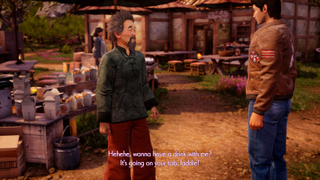
At a certain point in the story, Ryo and Shenhua leave the relative safety of Bailu behind and find themselves in Niaowu, a bustling port city that suddenly and massively increases the scale of the game. After hours spent in the close-knit, pastoral Bailu Village, stepping off the boat here is a real shock to the system. It's beautiful too, especially at night, with glowing lanterns and traditional Chinese architecture. Niaowu is huge and a thrilling change of scenery, recalling the stark contrast of Yokosuka and Hong Kong in the original games. The story also picks up here, although I say that in relative terms; it's still extremely slow.
Here's the thing: despite waiting almost two decades for a conclusion to Ryo Hazuki's story, this isn't it. Creator Yu Suzuki always intended Shenmue to be at least a five-part series, and I have to admire him sticking to his guns. That said, I was expecting a little more in terms of pushing the story forward from this sequel—although there are some big revelations, as well as a few smaller ones that fans will get a kick out of. Ever wondered what Tom the hot dog vendor from Dobuita Street is up to these days? Or how Nozomi is getting on in Canada? Shenmue 3 answers some of these lingering series questions.
Logged off
So it's clear I really enjoyed my time with Shenmue 3, but I do have a few gripes. Design-wise, some of the character models are comically inconsistent. You'll talk to a relatively normal, human-looking NPC one minute, then some kind of exaggerated, hideous caricature the next. It's like they're from different games. There are also a few points in the story where you have to raise a big chunk of money, which means the narrative grinds to a halt as you spend days splitting logs, gambling, or shifting crates around. And I found having to buy and eat food to keep my stamina up a little like needless busywork at times, especially when I absent-mindedly stumbled into a tough fight with half a health bar because I'd been sprinting around too much asking people questions.
I really do love the lazy, laid back rhythm of the game
One complaint I don't have, however, is with the slow pace. Some people will undoubtedly find it maddening, especially when they play it for an hour and achieve basically nothing. But I really do love the lazy, laid back rhythm of the game. It's hypnotic and absorbing like nothing else on PC, perfectly recapturing the strange, sedate, melancholy magic of the original games. Wise old masters are forever telling Ryo to slow down, to have patience, to resist the urge to rush headlong into a confrontation with Lan Di, the man who killed his father. And it's advice anyone playing Shenmue 3 should take to heart.
Take a stroll through the wildflowers, pick some herbs. Shoot the breeze with the watchmen at the bridge leading into the village. Work on your capsule toy collection. Tell Shenhua about growing up in Japan. In an increasingly loud and relentless world, Shenmue 3 is an ocean of calm. Step back into 1980s China and just go with the flow. That's when that curious, hard to define Shenmue magic emerges and you find yourself completely entranced by it. Will Yu Suzuki ever finish his story? I'm not sure, but being invited back into his world is a rare treat we may never experience again. So might as well savour it, eh?
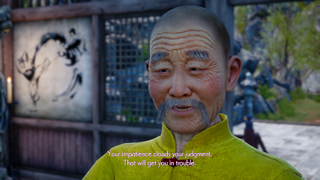
A seamless continuation of the series that makes up for its limitations with pure heart. It's like Ryo never left us.
If it’s set in space, Andy will probably write about it. He loves sci-fi, adventure games, taking screenshots, Twin Peaks, weird sims, Alien: Isolation, and anything with a good story.

2024 felt like the year gaming laptops finally started to grow up, so roll on 2025 and the mega-smart lappys to come

I played at least one retro game every week in 2024: Here are 10 I'd still recommend to everyone

Performing Hamlet in GTA Online felt like going back in time to the Globe Theatre where 'people would just throw apples at you, or there were prostitutes coming and going,' say award-winning filmmakers
